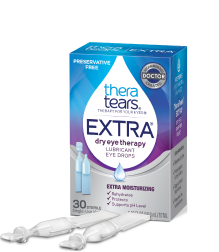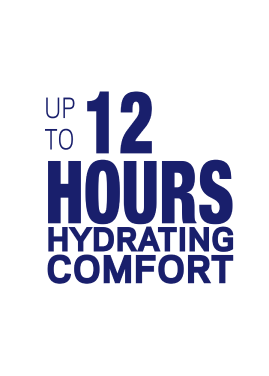Science-Backed Hydration™

Best Practices for Nighttime Dry Eye Prevention
If you’ve been waking up with dry, burning, or irritated eyes, the problem could be nighttime eye dryness. When you sleep, you no longer have the benefit of constant tear replenishment to protect your eyes from dryness. This is because during sleep you are not blinking. While you don’t have control over how much you blink during sleep, you do have control over many other factors that can contribute to having dry eyes at night.
10 Ways to Prevent Dry Eyes at Night
Everyone wants to wake up feeling refreshed and ready for the day, but having dry, irritated eyes first thing in the morning can be a setback. Let’s see what we can do to prevent that. Here are our best tips for preventing dry eyes overnight.
1. Use nighttime eye drops
You probably expected us to say this, but it’s true. One of the easiest ways to reduce nighttime eye dryness is by applying eye drops specifically formulated to help maintain the moisture barrier on your eyes while they’re closed.
TheraTears Nighttime dry eye drops have 4X the active ingredient* for a subtly thicker, hydrating experience for tired, dry eyes while you sleep; *vs. TheraTears Original
TheraTears® eye drops provide immediate, long-lasting relief that restore eyes’ natural balance. They’re not only a common treatment for nighttime dry eyes, but they’re also one of the best ways to relieve dry eyes at night.
2. Stay hydrated all day long.
This is another easy way to help reduce dry eye symptoms while you sleep. Our body’s cells—from our brain and eyes to our skin and joints—thrive on hydration. Make sure you’re getting enough water or fluids each day. The National Academy of Medicine suggests women drink at least 9 cups and men drink at least 13 cups of water a day.
Keep in mind age, activity level, medications and certain health conditions can affect the amount of water you need each day, so talk to your doctor to understand your personal daily fluid intake needs.
3. Gently wash your eyes and apply a warm compress before bed.
Your eyes collect dust and debris all day long that you may not even notice. Allergens in the air, dust in the workplace, residue from make-up, and debris and bacteria that transfer from your fingers when you touch your eyes can end up clogging the glands that secrete oil that protects the tear film. This makes it harder for your eyes to stay lubricated overnight.
At the end of each day, before you go to bed, gently wash your eyelids and around the eyes whether you wear makeup or not. The key here is to be gentle. You can use a soft washcloth or a disposable wipe made for cleaning your eyes. When you’re finished, you can apply a warm compress for 5 to 10 minutes to help soften any unseen buildup that is blocking your oil glands and preventing tears. Then you can put in nighttime eye drops and go to sleep.
4. Use a humidifier and air purifier.
Heat and air conditioning indoors, especially within a closed bedroom, can be as almost as drying as living in a desert. Using a humidifier at night—or an integrated home system if you live in a dry climate—can help prevent your eyes from feeling dry in the morning. In addition to this, using a high-efficiency particulate air (HEPA) purifier can remove tiny particles of pollution, dirt and allergens that are produced indoors and seep in from outdoors. An air purifier can be particularly helpful if you live in a major city or an area with moderate to high levels of airborne pollution and allergens.
5. Do not sleep with air blowing across your face.
Set your bed in a place where no fans or heating and air conditioning vents can blow air on your eyes. This air can dry out your tear film and, with no blinking at night to replenish tears, you can end up with dry eyes. So, you can sleep with a fan on, but just make sure the fan or any other air cooling or heating in the bedroom does not blow into your eyes. If this is difficult because of the way the bedroom and air ducts are designed, use a well-fitting sleep mask to block any blowing air and protect your eyes overnight. The bonus of an eye mask is you may actually get better sleep since it provides total darkness.
6. Change and wash bedding and sleep clothing frequently.
Your sheets, pillowcases and comforter collect dust, allergens and dirt or makeup debris every day. Your eyes can easily pick up tiny particles of dust, dirt, skin flakes and allergens just by resting your head on the pillow. While changing and washing bedding can be a chore, be sure to put on clean bedding at least once a week—it’s worth the effort!
7. Practice good contact lens hygiene.
We say this all the time: sleeping with contact lenses in—even extended-wear ones—not only lead to or worsen dry eyes, but can also lead to eye infections. If you forget and nap or sleep with contact lenses in, don’t panic. Use that as a trigger to take extra care of your eyes. Use an over-the-counter eyelid cleanser wipe to gently clean inside and around your eyelids. Consider taking a break and wear your glasses for a day. Be sure to clean your lenses as directed, because putting in or keeping in dirty contact lenses can also irritate, dry and infect your eyes.
8. Wear eye protection when outdoors.
This dry eye prevention tip applies to everyone but is especially important for people who work outdoors. As mentioned, there are many irritants in the air outdoors that can bother and dry your eyes, and the sun counts as an irritant too. Both wind and sun can make tears evaporate faster. Wear wraparound sunglasses or ones that block as much of the air and sun from getting to your eyes as possible. If you work outdoors, wear protective goggles with UV protection to keep any dust, dirt and debris from your work from reaching the eyes.
9. Stop smoking and vaping.
Both cigarette smoke and vaping can leave your eyes dry, red and gritty feeling. It’s not just your imagination. In fact, people who smoke cigarettes and vape report even more trouble with dry eyes, redness, light sensitivity, burning and blurry vision.1 And that’s only the start of eye problems; smoking and vaping can lead to because the risks of eye diseases—such as macular degeneration, cataracts and uveitis—increase as well.
10. Get regular checkups from your doctor.
Your doctor is one of the best preventive medicine tools you have. Getting regular checkups for your eyes and your overall health can help find potential problems early. For example, did you know that aging and changes in hormones can cause changes to your eyes such as dry eyes? Also, if you have an autoimmune condition like rheumatoid arthritis, Hashimoto’s thyroiditis or Sjögren’s syndrome, dry eyes can be a side effect.
Your doctor can also tell you if any medications you take can cause dry eyes. Knowing this can help you either lessen the effect by being proactive about treating dry eyes or your doctor may be able to recommend a different medication that does not have the same drying effect.
Another reason to see your doctor is that you might have a sleep disorder that is contributing to dry eyes or a condition called nocturnal lagophthalmos, in which you cannot close your eyes completely while you sleep.
The more you know about dry eyes the easier it is for you to take steps to help prevent or lessen their impact, including creating a daytime and nighttime eye care routine and understanding the best daytime and nighttime dry eye treatments for your individual needs.
1Nguyen, A., Gaiha, S., Chung, S., et. Al. “Ocular Symptoms in Adolescents and Young Adults with Electronic Cigarette, Cigarette, and Dual Use.” JAMA Ophthalmol 2023;141(10): 937-46. https://jamanetwork.com/journals/jamaophthalmology/fullarticle/2809094
EXTRAordinary relief, now available in preservative free vials
TheraTears EXTRA dry eye therapy

EXTRAordinary relief, now available in preservative free vials

